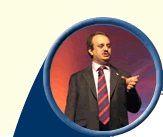|
Meet Frank Smith
Gifts of wisdom for educators
By Gary S. Stager, Ph.D.
Originally published in District Administration Magazine - December 2003
© 2003 Professional Media Group LLC
Christmas came early to the Stager house when a pre-publication copy of Frank Smith's latest book arrived this summer. I have long admired Smith for his intellect and remarkable ability to make complex ideas accessible.
Few intellectuals share Smith's ability to explain complex scientific theories, and arguments against them, in a fashion that feels like a conversation with an old friend.
The skill with which he writes provides readers with a vocabulary for discussing their own learning experiences. This is particularly true for educators; they will find that his books give voice to the nagging pit in their stomachs caused by current educational trends.
For those of you unfamiliar with his work, Smith is a 75-year-old psycholinguist, currently living in Ontario. His many books, including: Insult to Intelligence; Reading Without Nonsense; and Joining the Literacy Club are popular favorites among literacy educators. Whether you have always wanted to understand the zone of proximal development or just need a book to share with a neighbor concerned about her daughter's education, Frank Smith is the author of choice.
His beautifully written The Book of Learning and Forgetting. (Teachers College Press, 1998) explains the history of learning theories and the events that shaped our current educational structure. Smith establishes two ways of thinking about educational practice--the official view of learning and the classical view. The official view of learning may be simply expressed as the belief that learning only occurs when a person is taught. So many of our educational practices seem based on the notion that there would be no knowledge if people meaningful experiences and through immersion in a community of practice.
In Between Hope and Havoc: Essays into Human Learning and Education (Heinemann, November 1995), I was struck by the recommendation that we continue the popular rhetorical shift of the past decade from teaching to learning. However, he suggests that we need to make a big leap to an emphasis on doing. Even in these stressful times of voracious demands for increased accountability, an emphasis on doing serves children and feeds the beast. When a child comes home from school, mom does not ask, "Did the disaggregated data place you in the right quartile towards adequate yearly progress?" She asks, "What did you do in school today?" Parents choose a school based on what children do there.
Instead of talking about what teachers should teach and what students should learn, Smith argues that we should talk about experiences that they should be mutually engaged in, involving reading, writing, imagining, creating, calculating, constructing, producing and performing.
No Nonsense Reading
Smith's latest masterpiece, Unspeakable Acts, Unnatural Practices: Flaws and Fallacies in "Scientific" Reading Instruction, (Heinemann, 2003) is impossible to put down. You'll want to read it in one sitting. Best of all, you probably can. You are, however, likely to read it over and over. While the title implies the book is about reading, it is about learning all sorts of things.
The book discusses the educational use of technology, the teaching of math and the destructive practice of expecting all students to learn at the same pace. Smith explores our odd human desire to explain every phenomenon in a mechanistic fashion and reminds us why this line of reasoning is counterproductive to learning. He does not just whine about current educational practices, he offers no-nonsense alternatives.
Not to give too much away, Smith reduces our educational problems to a simple dichotomy. You either believe that learning occurs naturally or unnaturally. If you believe that learning is unnatural than all sort of mechanistic systems must be devised to ensure that a person learns, even if the learner has other impulses.
This profound new book makes a great read and a fabulous holiday gift for your staff, friends or relatives interested in creating the most productive learning experiences possible for children.
|
